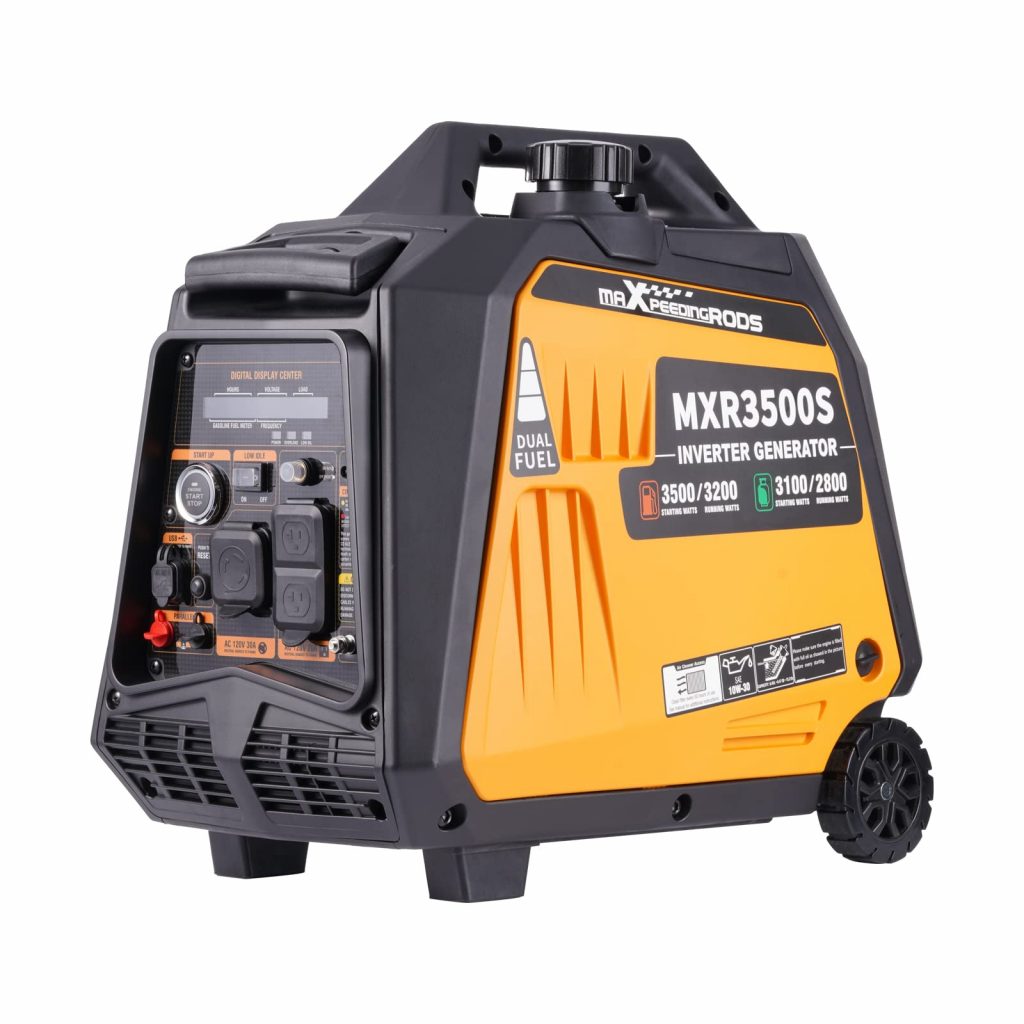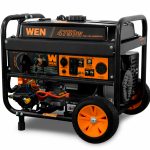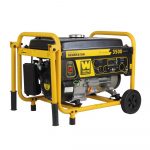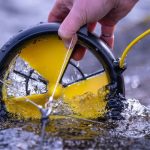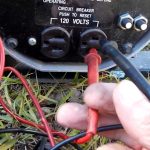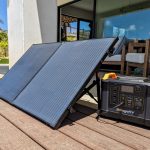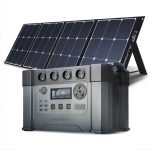A small propane generator for RV is a great way to provide power to a recreational vehicle. It is cost-efficient, quiet and eco-friendly. One of the most popular types of small propane generators is the inverter generator. The inverter generator is designed to generate electricity from a variety of fuels, including propane. Inverter generators can easily be connected to propane tanks, providing a reliable and sustainable supply of energy.
This makes them a perfect choice for RV owners who want to save money on their electricity costs. Inverter generators are also very efficient, as they can generate more power than traditional generators while consuming less fuel. This makes them a great option for RV owners who want to save money on their propane costs. In addition, inverter generators are much quieter than traditional generators, making them ideal for campers and people who need a quiet source of energy. This is because inverter generators use an internal inverter to convert alternating current (AC) to direct current (DC). This ensures that the generator operates at a much lower noise level than a traditional generator. Overall, inverter generators are a great choice for RV owners who want to take advantage of a reliable, cost-effective, eco-friendly and quiet source of power. They are designed to run on propane, making them an ideal option for those looking for a small propane generator for RV.
Is a propane generator cheaper to run than a gas generator?
When it comes to deciding whether a propane generator or a gas generator is more cost effective to run, the answer depends on a few factors. Generally, propane generators are more efficient than gas generators, so they are usually cheaper to run. Propane is more efficient and burns more cleanly than gas, allowing you to get more power out of the same amount of fuel. The cost of the fuel is another factor to consider. Propane is often less expensive than gas, so if you can find a good deal on propane, it can be significantly cheaper to run a propane generator than a gas generator.
If you are looking for a cost-effective way to power your RV, a small propane generator is an excellent option. It is cheaper to run than a gas generator and is more efficient, which means you’ll get more power out of the same amount of fuel. Plus, with propane, you won’t have to worry about storing or disposing of the fuel, making it the perfect choice for RV owners.
How long will 500 gallons of propane run a generator?
Running a small propane generator for RV with 500 gallons of propane can last anywhere from 2000 to 2500 hours. This can translate to anywhere from 83 to 104 days of continuous operation. Depending on how often you use the generator, 500 gallons of propane can last anywhere from a few weeks to more than three months. It all depends on the capacity and efficiency of your generator as well as your energy requirements. If your propane generator is used for low-power applications, like powering lights and fans, 500 gallons of propane might last for more than three months.
But, if you are using it for high-power applications, like running air conditioners, the 500 gallons of propane may not last for more than a few weeks. In order to make sure that you get the most out of your 500 gallons of propane, it is important that you use the generator wisely and efficiently. Make sure you turn it off when it is not in use, and only use it when absolutely necessary. With proper management, 500 gallons of propane can last you quite a while.
How long will an inverter generator run on propane?
A small propane generator for an RV can run on an inverter generator for an extended amount of time. Depending on the size and capacity of the generator, it can last up to 12 hours or even more. It is important to consider that most inverter generators are designed with a low-noise technology and a fuel-efficient system in order to conserve the propane and reduce emissions. The size of the generator is also an important factor for determining the running time of an inverter generator. Generally, the larger the size of the generator, the longer it will run on propane.
However, it is also important to note that the running time of an inverter generator will also depend on the load and power demand. When using propane for an inverter generator, it is important to ensure that the supply of propane is adequate and that the flow of propane is consistent. This will help to extend the running time of the generator by allowing it to run more efficiently. It is also important to regularly check the propane level and fuel filter to make sure that the generator will run without any issues. In conclusion, depending on the size and capacity of the generator, as well as the load and power demand, a small propane generator for an RV can run on an inverter generator for up to 12 hours or more. To maximize the running time and efficiency of your generator, make sure to monitor the propane level and fuel filter regularly.
Can you run a propane generator 24 hours a day?
Using a small propane generator for RV can be an efficient way to power your RV while you’re away from home. But the question remains, can you run a propane generator 24 hours a day? The answer is yes, you can run a propane generator 24 hours a day. However, it is important to make sure that you have the right size generator for your RV and that the generator is properly maintained. You also need to be aware of the fuel consumption and adjust it accordingly to ensure that your generator is running efficiently at all times. It is also important to remember that propane generators can produce a lot of heat, so you should make sure the generator is in a well-ventilated area.
If the generator is running hot, you may need to adjust the generator’s load in order to keep it running at its optimal temperature. Additionally, it’s important to remember that propane generators are not to be used indoors because they generate carbon monoxide, which can be deadly if inhaled. Make sure the generator is placed in a well-ventilated area outdoors to keep it running safely and efficiently. Finally, it is important to keep the generator clean and well-maintained. This includes changing the oil and spark plugs on a regular basis, as well as regularly checking the fuel lines for any signs of wear and tear. Following these simple steps will help to ensure that your propane generator runs safely and efficiently for 24 hours a day.
How long will a 3500 watt generator run on a 20 lb propane tank?
A 3500 watt generator is perfect for powering an RV with small propane tanks. This type of generator will run for approximately 12 hours on a 20 lb propane tank. That is based on the assumption that the generator is running at a constant output of 3500 watts. If you are using the generator intermittently, or at a lower output, you could get a longer run time. It is important to note that the generator will become less efficient as the propane tank gets low.
This means that you may get less run time on the same tank. To ensure maximum efficiency, it is best to replace the propane tank when it gets low. Propane generators are a great source of power, especially for those who are using an RV. With the proper care, a 3500 watt generator powered by a 20 lb propane tank can provide power for up to 12 hours. With the extra efficiency gained from intermittently running the generator, you can easily get even more power from the same tank.
Which is cheaper to run propane or gas generator?
When it comes to small propane generators for RV use, propane is typically cheaper to run than a gas generator. Propane is a clean burning fuel that is more efficient than gasoline and produces fewer emissions. Propane tanks usually hold more fuel than gasoline tanks, so you can run your generator for longer periods of time without having to refuel. Additionally, because propane is stored in liquid form, it does not degrade over time like gasoline does. Propane generators are also generally easier to maintain than gas ones.
They don’t require as much cleaning or oil changes and don’t need to be tuned up as frequently. They tend to be quieter than gas generators, making them a better choice for RV use. Propane generators are usually more expensive than gas generators, but the cost is offset by the lower fuel and maintenance costs over time. Propane generators also tend to last longer than gas generators, so you can get more use out of them in the long run. When it comes to small propane generators for RV use, propane is usually the better option. It’s cheaper to run, produces fewer emissions, and requires less maintenance than gas generators. Plus, you get the benefit of a longer overall lifespan with a propane generator.
How long will a 20 lb propane tank run a generator?
The amount of time that the generator will run is largely determined by the size of the propane tank. A 20-pound propane tank can provide up to 8 hours of power for a small propane generator for an RV. This will depend on the wattage of the generator as well as the size of the load that is being powered. For lower wattage generators, a 20-pound propane tank can last up to 8 hours. For higher wattage generators, a 20-pound propane tank will only last up to 4 hours.
It is important to remember that the amount of time that a 20-pound propane tank will last can be reduced if the generator is running at full capacity. If you are only running small appliances, such as lights, you may be able to get more than 8 hours of power from the tank. When it comes to refilling the propane tank, a 20-pound propane tank can easily be refilled at any propane station. If you plan to be off-grid for a long period of time, it is a good idea to buy enough tanks to last the duration of your trip. In summary, a 20-pound propane tank can provide up to 8 hours of power for a small propane generator for an RV. However, this can vary depending on the wattage of the generator and the size of the load. It is important to plan ahead and bring enough tanks for your trip to ensure that you have enough power for your RV.
What is the best portable generator for RV?
A small propane generator for an RV is the best portable generator for those who are looking for an efficient source of power. It provides a reliable source of energy and is easy to maintain. It is also small and lightweight, making it easier to transport. Propane generators are a good choice when it comes to RV generators because they are reliable and don’t require a lot of maintenance. Propane has been used in RV generators for many years, and it is generally easier to find than gasoline or diesel.
When purchasing a small propane generator for an RV, it is important to consider fuel efficiency, noise levels, and portability. Fuel efficiency is important because a lot of propane is needed to keep the generator running for a long time. Noise levels are important because you don’t want to disturb your neighbours or other campers. Portability is important because you want to make sure you can easily move it from place to place. When choosing a generator for an RV, it is also important to consider the type and size of RV you have. You want to make sure the generator is sized correctly for your RV and has the necessary power output for the appliances you are using. It is also important to look for a generator that is durable, reliable, and easy to use. Overall, a small propane generator for an RV is the best portable generator for those who need a reliable source of power while camping. It is small and lightweight, making it easy to move and store. It is also fuel efficient and quiet, so you won’t disturb your neighbours or other campers. When choosing a generator, it is important to consider the type and size of RV you have, fuel efficiency, noise levels, and portability.
How to power your RV from a generator?
Here is a step-by-step guide to get you started:
- Make sure your generator is properly sized for the RV. If it is too small, it may not be able to provide enough power to run all the RV’s appliances.
- Install the generator in a well-ventilated area. This is important to ensure that no fumes build up inside the RV and that the generator does not overheat.
- Connect the generator’s output to the RV’s power panel. If the RV does not have a power panel, you can connect the generator directly to the appliance you want to power.
- Position the generator so that any exhaust fumes are directed away from the RV.
- Start the generator and check the voltage to make sure it is within the RV’s operating range. If necessary, use a voltage regulator to adjust the voltage.
- Once you have the correct voltage, you can turn on the RV appliances and enjoy your time outdoors!
How much fuel does a RV generator use?
A small propane generator for an RV typically uses about 0.22 to 0.45 gallons of fuel per hour, depending on the size and model of the generator. On average, larger generators tend to use more fuel than smaller generators. When running the generator for longer periods of time, the fuel consumption increases. If running the generator at full capacity, it may reduce the fuel efficiency even further. The amount of fuel used also depends on the type of activity the generator is being used for.
For example, running the air conditioner or charging a battery uses more fuel than running a light. For RV owners who are concerned about fuel consumption, it can be beneficial to run the generator at half capacity. This can help to reduce fuel consumption and extend the fuel life. To ensure the generator is running efficiently, it is important to make sure it is in proper working order and that the fuel lines and air filters are clean. Proper maintenance and proper fuel usage can help keep fuel consumption low.
What generator is best for RV camping?
A small propane generator is the best option for RV camping. Propane is a safe, reliable, and easy to find fuel source. It is also easy to store and transport. A small generator is also more efficient and quieter, making it the ideal choice for camping. Small propane generators are also more cost-effective than gasoline or diesel generators, making them even more attractive for RV camping.
Propane generators can provide enough power for all your RV’s needs, including a refrigerator, AC unit, and other appliances. The small size of the propane generator also means that it is easy to store and transport. This makes it perfect for taking on camping trips. You can easily fit it in the trunk of your car for quick and easy access. Overall, a small propane generator is the ideal choice for RV camping. It is cost-effective, efficient, quiet, and easy to store and transport. With a small propane generator, you can rest assured that you will have all the power you need for your RV camping adventures.
What is the smallest generator for an RV?
The smallest generator for an RV is usually rated in wattage output and ranges from 1000 to 2000 watts. This wattage output is typically enough to provide power to common RV amenities such as lights, small appliances, and charging devices. You should also consider the noise level of the small generator for RV. Small propane generators are typically quiet, producing little to no sound when running. This is great for those who don’t want to bother their neighbors or other campers.
When choosing a small generator for RV, it is important to consider the cost and availability of fuel. Propane is usually the fuel of choice and is relatively inexpensive. It is also widely available, so you don’t have to worry about running out at a critical moment. Finally, it is important to make sure the small propane generator for RV is suited for the environment in which it will be used. For example, if you are camping in an area with higher elevations, you will want to look for a generator that can adjust for altitude. Overall, a small propane generator for RV is a great way to get power on the go. With the right generator, you can get the power you need to run lights, small appliances, and charge your devices. Just make sure to consider the wattage output, noise level, cost, and availability of fuel, as well as the environmental conditions before making a purchase.
What is the quietest and best generator for an RV?
A small propane generator for RV is the best and quietest option for camping or recreational activities. It is more reliable than gas generators and provides a more consistent power supply. Its low noise level is perfect for outdoor activities, allowing you to enjoy the outdoors without the loud noise of a gas generator. The propane generator is also more efficient than gas generators and doesn’t require much maintenance. It generally has a long life span and runs for longer periods of time without needing refueling.
This makes it ideal for long road trips or extended camping trips. The propane generator is also an economical choice for RV owners. Its fuel consumption is lower than gas generators, and its maintenance costs are minimal. In addition, it emits fewer toxins, making it a more environmentally friendly option than gas generators. The propane generator is also much easier to install and use than a gas generator. It requires less wiring and doesn’t need to be vented, making it a great option for those who don’t want to spend a lot of time setting up a generator. Overall, the small propane generator for RV is the quietest and most reliable option for recreational activities. Its low noise level, efficiency, and environmental friendliness make it an ideal choice for RV owners who want to enjoy the outdoors in peace.
What is a good quiet generator for an RV?
Not only is it quieter than other types of generators, but it is also more fuel efficient. Propane generators produce fewer emissions than gasoline, making them better for the environment. Additionally, they are more reliable and require less maintenance than gasoline generators. Propane generators are also easier to use and safer to operate since they don’t require the same level of care and attention that gasoline generators need. They are also easy to start and provide smooth, reliable power.
They are also less likely to overheat and can run for a longer period of time before needing to be refueled. When selecting a propane generator for an RV, it’s important to consider the size of the generator, its power output and the type of fuel it uses. Make sure that the generator is designed to handle the power needs of the RV, as some generators may not be able to provide enough power. Additionally, some generators may be louder than others, so it’s important to look for a generator that is both quiet and powerful. In conclusion, a small propane generator is a great option for an RV that needs a quiet and reliable generator. They are more efficient and require less maintenance, and are also easier to use than gasoline generators. When selecting a generator for your RV, make sure to consider the size, power output and type of fuel it uses to ensure that it meets the needs of your RV.
How long will a propane generator run RV?
A small propane generator for RV can be a great way to keep your RV powered while out on the road. The question is, how long will a propane generator run RV? The answer depends largely on the size of the generator and the amount of propane you have available. Generally, you can expect a small propane generator to run your RV for up to 8-10 hours on a full tank. The exact amount of time your generator will run depends on the load it is running, the efficiency of the generator, and the size of the tank. If you want to extend the running time of your generator, you can opt for a larger tank or buy additional propane cylinders.
However, keep in mind that propane can be expensive, so make sure to do your research and find a propane generator that fits your budget. If you plan on using your propane generator for long trips, you should also consider investing in a generator with a larger fuel tank. This will help ensure that you won’t run out of fuel when you’re far from home. In summary, a small propane generator for RV can be a great way to keep your RV powered while out on the road. With the right size tank and fuel, you can expect it to run your RV for up to 8-10 hours. With additional fuel and larger tank options, you can extend the running time of your generator as needed.
How long will a 20lb propane tank last heating an RV?
A 20lb propane tank is the perfect size for powering a small propane generator for an RV. It can typically last for around five to seven days, depending on the size of the RV and how often it is used. The amount of propane consumed will vary depending on the temperature outside and how much fuel is being used to heat the RV. Generally, a 20lb tank can heat an RV for around twenty to thirty hours. It is important to keep the propane tank topped off, as it will last much longer in the long run.
You should also make sure that your generator is in good condition and that it is serviced regularly. Doing so will help to ensure a long life for your propane tank. In general, you can expect a 20lb propane tank to last for around five to seven days, depending on the size of the RV and how often it is used. Keeping the tank topped off and ensuring your generator is serviced regularly will help to extend the life of your propane tank. It is always important to keep safety in mind when dealing with propane tanks. Make sure to follow the instructions that come with your propane tank and generator to ensure proper usage and to avoid any accidents or injury.
How long will a propane generator run on a 20 lb tank?
A small propane generator for an RV can run for about 20 hours on a single 20-lb tank of propane at half-load. This means that it can run for up to 12 hours at full-load, although you will likely want to keep it running at half-load to conserve fuel. When running a propane generator, it’s important to check the fuel level regularly to ensure it doesn’t run out. If the fuel runs out while the generator is running, it could cause serious damage to the engine. Propane has several advantages over gasoline, including that it is non-toxic, non-explosive, and can be stored for longer periods of time without degrading.
It is also more cost-effective and efficient than gasoline. Propane generators are popular for RV owners because they are quiet and easy to maintain. With proper maintenance and care, a propane generator can last for many years. In conclusion, a small propane generator for an RV can run for up to 20 hours on a single 20-lb tank at half-load. This makes it an ideal choice for RV owners who are looking for a reliable and economical power source.
